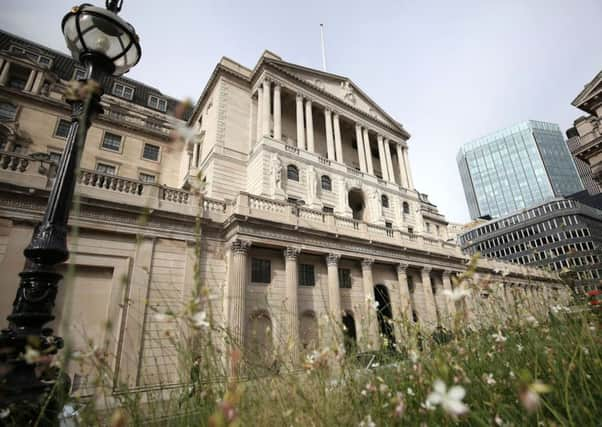BoE upgrades growth forecasts as rates held at 0.25%
This article contains affiliate links. We may earn a small commission on items purchased through this article, but that does not affect our editorial judgement.


Minutes of the latest monetary policy committee (MPC) decision showed policymakers voted unanimously to keep rates on hold at 0.25 per cent as the Bank made sweeping upgrades to its growth outlook.
But rate-setters warned that a consumer spending slowdown was still on the cards as soaring inflation caused by the weak pound and poor wage growth will see household income stall over the next two years.
Advertisement
Hide AdAdvertisement
Hide AdIn its quarterly inflation report, the Bank upped its forecast for gross domestic product (GDP) to rise by 2 per cent this year, 1.6 per cent in 2018 and 1.7 per cent in 2019. This is up from its November predictions for 1.4 per cent growth in 2017, 1.5 per cent in 2018 and 1.6 per cent in 2019.
It comes after growth of 0.6 per cent in the final quarter of 2016 as GDP remained surprisingly resilient since the Brexit vote last June.
But sterling slumped on the news, with the pound falling 0.3 per cent against the dollar to $1.26 and dropping 0.7 per cent against the euro at €1.16.
Neil Wilson, senior market analyst at ETX Capital, said: “Despite the upgrade to growth, the market sees this as a bit doveish as inflation is not expected to run away as much as thought and we are seeing sterling hand back earlier gains.”
He added that the upgrade was “a touch of humble pie for the Bank, as it’s been made abundantly clear that the economic Armageddon it expected in the event of Brexit has just not materialised. The UK remains the fastest growing G7 economy – not bad for a nation that some think has committed an act of self-mutilation in choosing to leave the EU.”
Anna Stupnytska, global economist at Fidelity International, said the Bank was in a “tough spot” as it seeks to balance the cyclical strength of the UK economy while bearing in mind the potential for a Brexit-related slowdown in the months ahead.
She added: “While the macro backdrop remains encouraging for now, investment intentions are already very depressed relative to growth and consumption is likely to be hit as inflation accelerates further.”
The Bank, which has now raised its growth outlook twice in the last three months, said the “most significant” reason for the upgrades was the government spending boost revealed in the Chancellor’s Autumn Statement last November.
Advertisement
Hide AdAdvertisement
Hide AdIt added that a solid global economy, surging stock markets and cheap borrowing were also helping support growth.
MPC minutes showed some policymakers believe it is becoming harder to justify keeping rates at record lows, with growth showing surprising resilience and inflation rising.
The Bank said: “The more time that passed without a noticeable reduction in economic growth, the more difficult it would become to tolerate the extent of the inflation overshoot.”
It is forecasting inflation to hit 2.8 per cent in the first half of next year, before falling back to 2.4 per cent in three years.
Some of the nine MPC members believe they are edging closer to the Bank’s limit in “looking through” above-target inflation.
Financial markets are factoring in a rate rise in 2018 and for borrowing costs to be hiked twice over the next three years, although economists are not expecting an increase until 2019.
The Bank said it would continue to balance the trade-off between higher inflation and growth in “such exceptional circumstances” and cautioned that the consumer spending spree boosting the economy is set to come to an end, which would weigh on growth.
Advertisement
Hide AdAdvertisement
Hide AdIt said a consumer spending slowdown is “highly likely given the scale of the depreciation of sterling and the consequent effect that higher import prices would have on real income growth”.
The latest forecasts come after the Bank’s chief economist Andy Haldane admitted last month the Bank had suffered a “Michael Fish moment” in making overly gloomy predictions last year over the impact of a Brexit vote.
Governor Mark Carney controversially warned that a Brexit vote could trigger a UK recession ahead of last June’s referendum.
The Bank halved rates to 0.25 per cent and unleashed a mammoth economy-boosting package in August to see off the threat of an expected sharp slowdown.
Calum Bennie, savings specialist at mutual Scottish Friendly, said “Robust economic growth isn’t helping families whose incomes will be stretched with rising inflation. Meantime, keeping interest rates at this all-time low is over-cooking the vegetables.
“The emergency of Brexit that led to the reduction to 0.25 per cent last August has passed. Low interest rates simply fuel consumer debt and what’s needed is more help to get people saving again so families will have funds to help them weather the economic vicissitudes ahead.”
